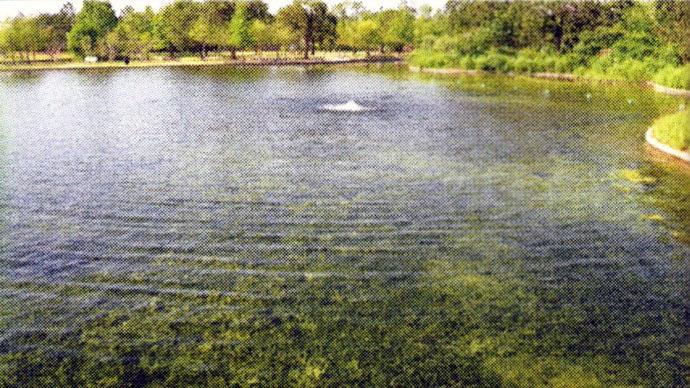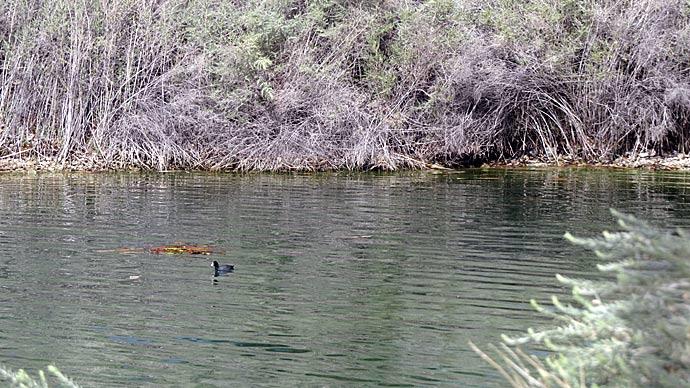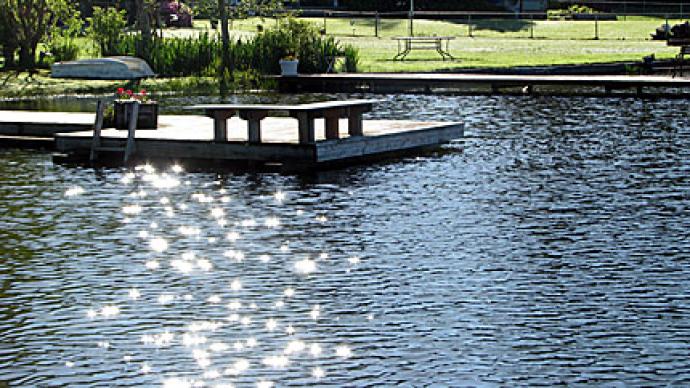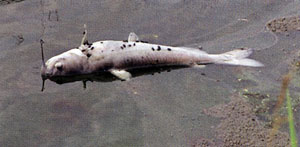
Fish kills ... such a disturbing occurrence that it makes television and print news when fish die in a public lake or stream. Lake managers work hard to mold and manage our beautiful lakes to our heart's desires. And, much of the time, fish play a significant role.
Can a fish die-off happen to you?
Absolutely. As a matter of fact, you should manage your pond with a reasonable expectation of a fish kill.
Hmmm .... never heard that advice, have you?
Those good folks who are most shocked by a fish kill are those who didn't expect it or make adequate plans to avoid this most dreaded of events. With several recent phone calls, emails and a spate of reports on the Pond Boss website forum, fish kills have reached higher proportions than normal.
By the time you pick up the phone and call your fisheries pro, or send that email or post on a discussion forum, it's too late. All someone can say is, "I'm so sorry" or, "it was probably oxygen depletion" or, "It might be this .... or it might be that..."
The bottom line is ... it is too late.
How do you manage your pond with a reasonable expectation of a fish kill and a focus to prevent it? By understanding the root causes of fish death. There are only a handful of reasons fish die.
Water quality, disease, water quality, outside toxicity, water quality, water quality water quality.
Take the two easiest ones ... disease and outside toxicity. Fish diseases are not likely to be the cause of death in a healthy recreational pond. As a matter of fact, when fish die of diseases, it is usually a consequence of overcrowding or bad water quality.
Most of the time, the disease is the symptom, not the problem. But, for the sake of clarity, there are ponds with fish which die from disease organisms ... as rare as it is.
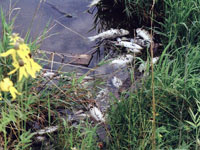
When analyzing a fish kill and you want to eliminate disease as the cause of death, the first clue will be to look for dead single species of fish of similar size. If you have that symptom, look at diseases first. If multiple species and multiple sizes die, look at toxicity or water quality.
Outside toxicity can happen. There are several common scenarios. The most investigated cause is improper use of pesticides. Personally, I have documented cases of fish kills from ranches where cattle were routinely dipped in insecticides, released and immediately headed toward a pond. Put fifteen or twenty head of insecticide laden cattle into a small pond, and fish die. Other cases have been pesticide drift from crop dusters... in these days and times, that's a rare occurrence. I have seen fish die from excessive herbicide treatments for aquatic vegetation, too much aluminum sulfate in an attempt to clear muddy water and too much of the wrong kinds of fertilizers in the watershed above. I have seen several cases of toxicity due to aflatoxin from moldy feed. If you have moldy feed, don't use it. The weirdest fish kills I have seen on more than one occasion are pudgy 3-5" bluegill, dead after recent rains which raise the level of some southern ponds. Fire ants. Rain, pond rises, fire ant mounds are flooded, fire ants float in balls on water's surface, bluegill attack and eat them. The bluegill thought they hit the motherlode of a smorgasbord. The poisons from these imported insects kill the bluegill from the inside. Perfectly healthy looking, fat bluegills, dead along the pond's shoreline with surprisingly fat tummies.
But, the number one reason for fish kills in private waters in North America is due to water quality degradation. Most of the time, we can point the finger of blame directly at ourselves. People allow water to degrade... usually without knowing it.
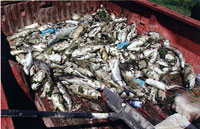
Folks, water can get too dirty for fish to live in it. It doesn't necessarily happen fast, either. Remember your lessons about the physical properties of water to fully understand this concept. Water is most dense, therefore it's heaviest, at 39 degrees, F. Warmer or cooler than that and water is less dense. Warm water is lighter than cool water. Cold water is lighter than cool water. Very important to understand. Here's why.
As living organisms do what they do, there are always by-products. Living plants metabolize, affecting water quality by altering the pH or the amounts of certain gasses dissolved in the water. When they die, plants slough off leaves or stems. Insects eat, metabolize and leave their waste behind. Fish feed, swim, breathe and metabolize. When fish live their daily lives, they too are giving off waste products. As a general rule of thumb, most fish convert dry weight of food about 1-1/2 or 2 to 1. That is, it takes 1- 1/2 to 2 pounds of dry food for a fish to convert to a pound of flesh.
That also means from a half to a pound of that dry weight food goes to waste... directly into the water, to be dealt with via the bio-chemical processes of the physical properties of water.
Your pond is its own septic tank.
The good news is ... Your pond can do process those wastes, with a little help from its friends ... you.
Make sure dirty water comes in contact with the air and sun. That's it ... simple.
To prevent or diminish the risk of fish kills, pay attention to the water. Read prior articles about stratification and aeration. Follow the water ... it will lead you to the truth.
Move water to cleanse it. Clean water is the foundation for a healthy pond and its occupants.
For years, there have been several ways to keep water clean. First off, water stagnant with "normal" dissolved waste products tends to sink. For years, pond managers have learned they can drain a foot or two of that nasty, stinky, stagnant water off a pond several times yearly by opening a bottom water release valve or using a siphon system. Still other practical measures are to use a bottom water release system so every time a rainstorm blesses your pond, fresh rainwater will flow in, across the top, and force dirty water to leave from the bottom, through a thoughtfully designed piping system.
Nowadays, as pond management is beginning to mature, we have a plethora of aeration options.
Want to prevent those sick feelings of a fish kill? Keep the water clean, keep it moving and keep it healthy.
Your fish will thank you.
Reprinted with permission from Pond Boss Magazine

